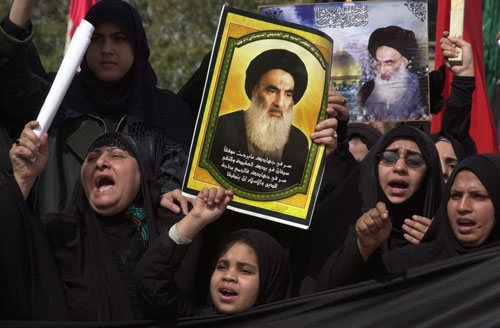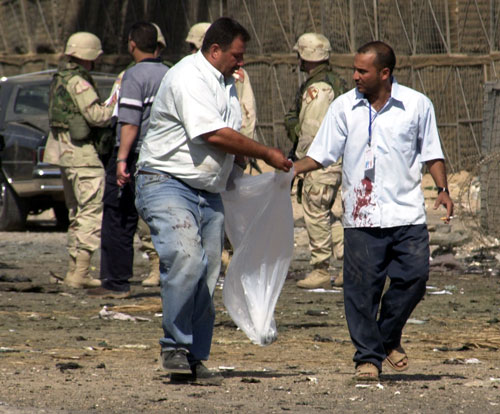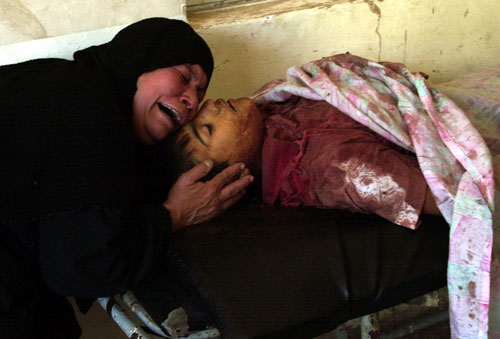I work as a photographer for AP. I do not work with any other press agency. I have a good mutual understanding with my boss about security procedures. He always reminds me that my safety is a priority and he always asks me to avoid danger as much as I can.
For the time being I work in Baghdad but from time to time I go to other Iraqi cities when necessary. People usually ask me about the agency that I work with. When they hear the word "American", they deliberately put obstacles in my way. I have to answer carefully to avoid trouble.
I work with a group of Iraqi, Arab and foreign photographers. We work as a team. Sometimes, I work with fixers and sometimes I work alone. As a photographer, most of the times the reaction of the people towards my work is negative. That normally takes place when big explosions happen and many people are killed as in the explosions of Ashura in Kadhimyah and Karabla.

Shiite women demonstrate support for Ayatullah Ali Al-Sistani / Samir Mizban
Because I am an Iraqi person, I have the priority of getting assistance from Iraqi people. The people can trust me more than foreigners. I always try to find good places and distances to shoot without the notice of the occupation forces and with the help of Iraqi people. I try always to hide between the Iraqi people when clashes take place. I always try to win the trust of people and make good relationships with people to get more assistance to facilitate my job. In the recent events of Falluja when the explosion of the American convoy on the express road between Falluja and Abu Ghraib took place and when all foreign photographers ran away from the scene, I was helped by Iraqi people and I took photos as fast as possible in that volatile place in spite of being exposed to the fire of the American forces and their aircrafts. Later on my photos were published in most of the world newspapers.

A man takes what's left from the bodies in the street after a blast in the center of Baghdad / Samir Mizban
I do not feel safe when people know that I work with an American agency. This is what endangers us and puts us in great trouble.
News photographers are always vulnerable here. We have been through much harassment and annoyances by American soldiers and Iraqi police. When they hear the word "American," they deliberately put obstacles in my way. I avoid disturbances and harassment which would end with them confiscating our discs.
The press became the victim in the conflict between fighters and the occupation forces. We suffer a lot to convince the people to let us take photos because many people accuse us of being spies and working for the interest of the Americans. Iraqis accuse the workers in the press of being spies and say that we do not convey the truth about human rights violations of the occupation forces who kill randomly and break into the houses of people in the middle of the night etc. But the occupation forces accuse the press of exaggerating the events and that is why these forces try always to hinder the work of the press.

A woman cries for her son killed in fighting between US forces and Iraqi insurgents / Samir Mizban
Many journalists were killed in Iraq: a correspondent of Al-Jazeera, Tariq Ayoob, killed April 7th, 2003; a Spanish cameraman was killed in the Palestine hotel and a Reuters photographer, Falih Khaiber, was injured; a Palestinian cameraman for Reuters was killed near Abu Ghraib prison; the correspondent of Al-Arabia Ali Al-Khatib and a cameraman both killed March 18th, 2004 near Burge Al-Hayat Hotel in Baghdad. Recently the correspondent of Al-Iraqiya satellite channel Assad Kadhim was killed and a cameraman injured April 19, 2004. Many others have been injured and many were arrested and their tools, cameras or their discs were taken from them.
My own camera discs were taken from me by the occupation forces that prevented me from taking photos in some volatile areas. I was exposed to shots fired by these forces more than once and recently I was caught between the troops and gunmen in Abu Ghraib.
The Iraqi police in Falluja once broke the camera of one of AP photographers then the people there hit him severely. The same photographer was also arrested by the militiamen of Al-Mahdi army in Kut then he was taken to Baghdad then released.
Once I was with my family driving my car when an attack on the Americans took place. We were caught amid the incident but I managed to drive away with a miracle. Now, too, the phenomenon of kidnapping appeared for the first time in Iraq under the occupation.
In spite of all the trouble that the journalists suffer from, and the dangerous situation in Iraq, we work honestly to convey the truth. The work in such dangerous places and hotbeds requires caution, precision and knowledge of places to hide when necessary. In spite of all that danger we always do our duty.
Samir Mizban is a freelance photojournalist for the AP in Iraq.

